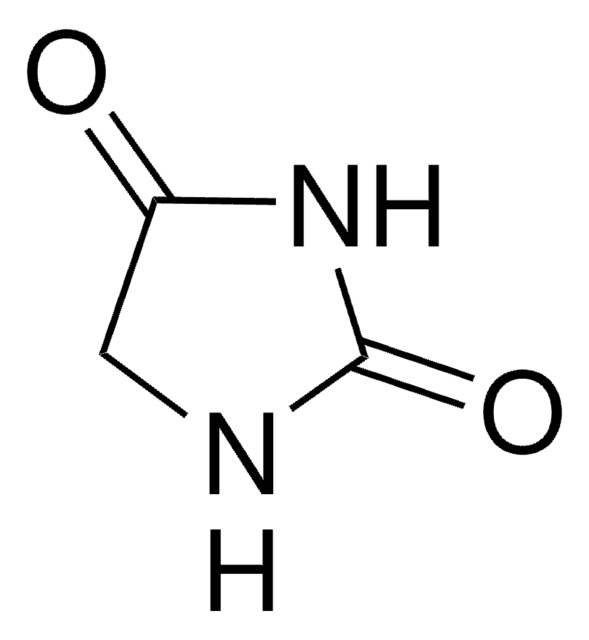05670
Allantoin
≥98.0% (N)
Synonym(s):
NSC 7606, 5-Ureidohydantoin, Glyoxylic(acid) diureide
Sign Into View Organizational & Contract Pricing
All Photos(1)
About This Item
Empirical Formula (Hill Notation):
C4H6N4O3
CAS Number:
Molecular Weight:
158.12
Beilstein:
102364
EC Number:
MDL number:
UNSPSC Code:
12352100
PubChem Substance ID:
NACRES:
NA.22
Recommended Products
Quality Level
Assay
≥98.0% (N)
form
powder
ign. residue
≤0.2%
mp
230 °C (dec.) (lit.)
functional group
amine
SMILES string
NC(=O)NC1NC(=O)NC1=O
InChI
1S/C4H6N4O3/c5-3(10)6-1-2(9)8-4(11)7-1/h1H,(H3,5,6,10)(H2,7,8,9,11)
InChI key
POJWUDADGALRAB-UHFFFAOYSA-N
Looking for similar products? Visit Product Comparison Guide
Application
Reactant for:
Synthesis of Mannich bases for use as antibacterial agents
Synthesis of sulofenur analogs for use as antitumor agents
Synthesis of Mannich bases for use as antibacterial agents
Synthesis of sulofenur analogs for use as antitumor agents
Biochem/physiol Actions
Purine metabolite via the uric acid pathway. Uric acid also reacts with free radicals to produce allantoin, thus allantoin may be a useful biomarker for oxidative stress.
Storage Class Code
11 - Combustible Solids
WGK
WGK 1
Flash Point(F)
Not applicable
Flash Point(C)
Not applicable
Personal Protective Equipment
dust mask type N95 (US), Eyeshields, Gloves
Choose from one of the most recent versions:
Already Own This Product?
Find documentation for the products that you have recently purchased in the Document Library.
Customers Also Viewed
Khairia M. Youssef, et al
Medicinal Chemistry Research, 11, 481-503 (2003)
Sh. Joshi
Oxidation Communications, 32, 714-723 (2009)
Juan Luis Díaz-Leal et al.
Journal of experimental botany, 63(11), 4095-4106 (2012-03-24)
The ureides allantoin and allantoate are key molecules in the transport and storage of nitrogen in ureide legumes. In shoots and leaves from Phaseolus vulgaris plants using symbiotically fixed nitrogen as the sole nitrogen source, ureide levels were roughly equivalent
Adviye A Tolun et al.
Annals of epidemiology, 22(12), 892-894 (2012-10-16)
Oxidative stress has been implicated in Down syndrome (DS) pathology. This study compares DS individuals and controls on their urinary levels of allantoin and 2,3-dinor-iPF2α-III; these biomarkers have been previously validated in a clinical model of oxidative stress. Urine samples
Raymond Javan Chan et al.
Radiation oncology (London, England), 7, 121-121 (2012-08-02)
Radiation-induced skin reaction (RISR) is one of the most common and distressing side effects of radiotherapy in patients with cancer. It is featured with swelling, redness, itching, pain, breaks in skin, discomfort, and a burning sensation. There is a lack
Our team of scientists has experience in all areas of research including Life Science, Material Science, Chemical Synthesis, Chromatography, Analytical and many others.
Contact Technical Service









